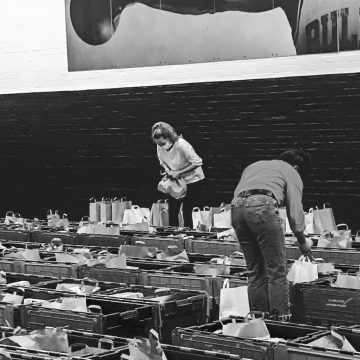Taran Vernon, 45, was caught up in the 2015 Nepal earthquake while taking part in a charity hike on the mountain with nine other climbers. ‘It was day six of the trip,’ she recalls. ‘We’d been steadily climbing every day and I was really pleased with my progress. Walking through little villages on the mountain trail, I’d been completely overwhelmed by the warm welcome from the locals I’d met. Everyone was so friendly. It really was incredibly remote and absolutely magical.’ However, Taran’s dream adventure took an unexpected turn just before midday, when the Gorkha earthquake hit, killing 21 people – the deadliest day in the mountain’s history.
‘We could actually see the bit of mountain in front of us shaking,’ relives Taran. ‘Within a few seconds of the earthquake starting we heard a rumble as an avalanche of rubble came through. It was so loud, I was completely terrified. Rocks were crashing around me but I had nowhere to go. There was nothing to stop anything falling on me and I was near a really steep drop. I felt so vulnerable and exposed on the bare mountain. The whole group were so confused as none of us had ever experienced anything like it before. I honestly thought I was going to die. It lasted less than a minute but it was the longest 45 seconds of my life. Thankfully our tour leader was quick to react and guided us to a plateau. Then, as we started to go back down the mountain, we saw the sights and beautiful buildings we’d photographed on the way up were now just piles of bricks. We were offered helicopters to airlift us out but as we were all fit and healthy, we wanted the helicopters to prioritise taking the injured from the base camp, and decided together to carry on walking down instead. The worst thing was seeing families whose homes had gone, just sitting in the dirt in utter shock.’
Taran later heard that many of the casualties were ahead of her on the mountain. ‘We were supposed to be at base camp but we were a day behind schedule,’ she explains. ‘We’d experienced a bit of bad weather and were diverted to a remote air base. Although we were all disappointed at the time we now realise how lucky we were.’ When Taran left Nepal she donated all of her belongings to the local community, leaving behind sleeping bags, medical supplies and clothing to help some of those affected. ‘It just didn’t feel as if that was enough,’ she reflects. ‘I wanted to be able to offer practical help. Since returning to the UK, Taran has been taking part in numerous fundraising activities for Nepal, and her experience on the mountain motivated her decision to become a Red Cross Community Reserve Volunteer in her local area. ‘As soon as I heard about the Red Cross scheme, I knew I wanted to sign up. In Nepal I saw human chains of people helping to remove rubble and support survivors. If there is ever a crisis in my own home town I want to be able to do something useful to help.’
The British Red Cross is aiming to recruit 10,000 volunteers across the UK who can help out when disaster strikes their local community. The community reserve volunteers will work together as a team during major emergencies, such as flooding, terror attacks or a major fire. Simon Lewis from the British Red Cross is delighted that Taran and thousands more like her are signing up to be volunteers. ‘We’ve seen, through the events of last year, including the Manchester Arena and London Bridge attacks, as well as the Grenfell Tower disaster, extraordinary compassion shown by ordinary people from local communities, when a crisis hits. It shows you don’t always need special skills to help others. Small acts of kindness and coming together as a team can make a huge difference.’ It’s the teamwork and community spirit that Taran is proud to be a part of. ‘Of course I hope there isn’t a crisis where I live, but it is reassuring to know that there are people willing to drop everything and pull together if ever we need it. I saw what a difference that made in Nepal, and I’m ready to do my bit for my neighbours if ever the need arises.’
Published in My Weekly.



